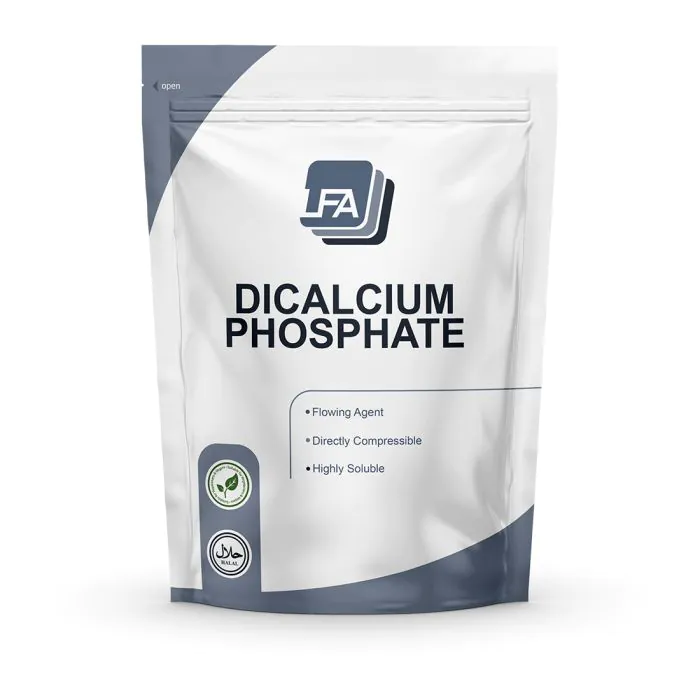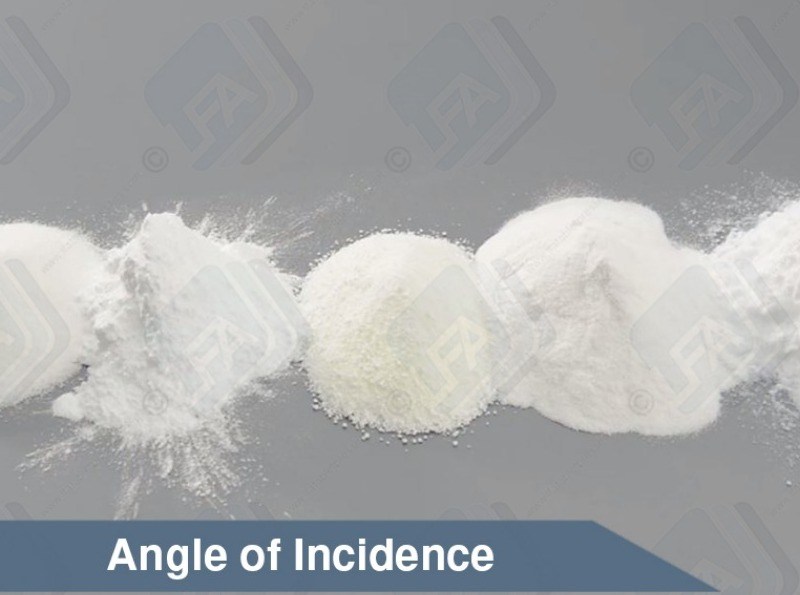Di-calciumfosfaat is een ingrediënt in een aantal verschillende producten. Het wordt gebruikt bij de productie van tabletten en capsules als "vloeimiddel". Di-calciumfosfaat is verkrijgbaar in verschillende maaswijdtes. De grovere soorten zijn hier verkrijgbaar ze vloeien goed en hebben een uitstekende samendrukbaarheid.
De vloeibaarheid is een cruciaal onderdeel van het productieproces. Het zorgt ervoor dat uw ingrediënten gemakkelijk door de machines zullen draaien. Bovendien betekent dit dat uw eindproducten consistente ingrediënten hebben. Dit zorgt ervoor dat elke tablet hetzelfde is.
Samendrukbaarheid is het gemak waarmee een poeder een vaste tablet vormt. LFA's Di-Calcium Fosfaat is direct samendrukbaar. Het gebruik van hulpstoffen zoals Di-calcium phosfaat vermindert de moeite die het kost om nieuwe formules te maken.
Di-Calcium Fosfaat is zeer goed oplosbaar in citroenzuur en ammoniumcitraat. Het heeft een pH van 6,5 tot 7. Dankzij de alkaliteit werkt het niet met een aantal zure actieve ingrediënten. Di-Calcium Fosfaat heeft matige bindende eigenschappen.Het zal moeten worden gebruikt met andere hulpstoffen.
Di-calciumfosfaat wordt makkelijk verwerkt door het spijsverteringsstelsel. Het heeft vele verschillende toepassingen, en is een voedingssupplement op zichzelf. Het wordt vaak opgenomen in ontbijtgranen, meel en noodle-producten. Het wordt gebruikt als antiklontermiddel omdat het kleine hoeveelheden vocht kan absorberen. Het is ook een minerale fosforbron die vaak wordt gebruikt in biologische voeding. Een andere prominent gebruik van Di-calciumfosfaat is in diervoeders. Het draagt bij aan de’stofwisseling van dieren en versnelt de groei en ontwikkeling.
Correct gebruik van Di-calcium Fosfaat is belangrijk voor de veiligheid en kwaliteit van het product. Dit product kan de ogen irriteren en inademing kan lichte pijn op de borst veroorzaken. Bij het hanteren, moet u oogbescherming, handschoenen en een inhalatie masker gebruiken. Bewaar Di-calcium Fosfaat in een afgesloten container met gematigde temperaturen. Vermijd blootstelling aan vocht en extreme temperaturen. Onjuiste opslag kan de hardheid van de tablet met de tijd beïnvloeden.
Di-calcium Fosfaat is een effectief vloeimiddel dat voedingsstoffen zal toevoegen aan uw formule. Het kan toegevoegd worden aan veel voedingsmiddelen als supplement om bij te dragen aan het welzijn van zowel mensen als dieren. Fosfor en calcium toevoegen aan het dieet van een consument zal de lichaamsfuncties op vele manieren verbeteren. Dit is een product waar consumenten bekend mee zijn met en het is de perfecte aanvulling op uw tablet.
LFA's Di-calcium Fosfaat wordt geleverd als crystalline poeder. Het is wit of gebroken wit, geurloos en vrijstromend.
Are all excipients safe for all ages to consume?
Yes, it does not matter what age, size or sex the person consuming the products is. It is, however, important to check the intolerance data.
Are all the excipients safe for human consumption?
Yes, all of the excipients are safe for human or animal consumption. There are some precautions that should be taken when handling them and there are some people that might have intolerances to some of them. Information on this can be found in the products MSDS and Intolerance Data Sheet. This can be found in this section for every excipient.
Are there any known allergens or health risks?
Zijn uw natuurlijke Hulpstoffen?
Ja, al onze Hulpstoffen worden gewonnen uit natuurlijke bronnen. Voor meer informatie kunt u terecht op de individuele product pagina ' s.
Can I get a better price for excipients than is listed on the website?
Yes, we have bulk pricing for all of our excipients, and these can be found in this section. We offer bulk in 500 kg, 1 ton, 2 ton and 5 ton lots. The prices are set on these quantities as these are the amounts that will fit on pallets.
Can I have a CoA for my Excipient?
Yes. CoA stands for Certificate of Analysis this is also known some times as an MSDS (Material Safety Data Sheet) all of the information contained in a CoA is inside the MSDS for every LFA product which is emailed to you after purchase.
Ik kan produceren tabletten zonder Hulpstoffen?
Het is onwaarschijnlijk dat u in staat zullen zijn om te produceren tabletten zonder enig gebruik van Hulpstoffen. Bepaalde producten binden zonder Hulpstoffen, maar dan niet de stroom door het apparaat. Wij adviseren dat u gebruik maakt van een
Dissolving rate? Any known factors that can affect the rate, speed up or slow down the breakdown of a tablet?
Yes. There are two things at play here. You can get hygroscopic and hydrophobic excipients. Hygroscopic means that they take on water quickly, while hydrophobic means that they repel water.
There are products know as supper disintegrants. These products help the breakdown of tablets. At the moment LFA does not sell any supper disintegrants.
Magnesium stearate is hydrophobic this means that it will slow the breakdown of a tablet.
However, it is used in such small amounts that most of the time it will not make a difference to our customer's products. If they would like to be sure then they should conduct what is known as a disintegration test.
Do any of the excipients increase the speed of damage to tooling? i.e. more granular?
Yes, Dicalcium Phosphate, if used in high amounts, will cause more damage to tooling than just Firmapress or MCC. However, there are not many situations in which this would be a good idea.
How long is the storage period of each excipient? What is the shelf life?
Firmapress - 2 years form batch date.
Dextrose - 3 years from batch date.
Dicalcium Phosphate - 3 years from batch date.
Microcrystalline Cellulose -
Magnesium stearate -
Lactose - 2 years from batch date.
Silica Dioxide - 2 years from batch date.
How should I clean contact parts that have come into contact with my excipients or active ingredients?
here are 6 steps that should be followed as a general rule of thumb when cleaning contact surfaces that have come into contact with powders:
Dry Clean - First you need to remove as much of the dry powder as possible. You can do this using a hover/vacuum. Make sure that the vacuum you are using has a filter good enough to handle fine dust.
Wet Clean - Next you need to perform a wet clean. This can be done with warm water and soap or if available an ultrasonic cleaner.
Rinse - Next you need to rinse off any soap with potable water (drinking water). You do not have to do this if you used an ultrasonic cleaner in the last step. It is important to ensure that all parts are thoroughly dried immediately after washing to avoid any rusting.
Sanitise - Next you need to sanitise the surface. This step is recommended by the FDA. There are a number of sanitising solutions available designed to be applied and left on.
Lubricate - You now need to lubricate any parts that require it. This should be with the appropriate grade oil or grease considering your use and greasing chart. Store - Finally store any of the parts in a cool dry place. If you are storing them on the machine then make sure the machine is in a temperature controlled environment with low humidity.
Wat is het verschil tussen het bereik van de hulpstoffen?
Wij bieden Microkristallijne Cellulose, magnesiumstearaat, Dicalciumfosfaat en Firmapress in ons assortiment van de hulpstoffen.
Microkristallijne Cellulose is een bindmiddel, waarin de inhoud van de tablet samen.
Dicalciumfosfaat is een vloeiende agent en helpt bewegen ingrediënten door de machine voordat ze worden gecomprimeerd.
Magnesiumstearaat is een droog smeermiddel en helpt weer met de beweging van de ingrediënten door de machine, maar ook helpt bij het uitwerpen van de tabletten uit de machine. Houd er rekening mee dat Magnesium Sterate niet binden door zelf.
Firmapress is een alles-in-een mix van Microkristallijne Cellulose, magnesiumstearaat en Dicalciumfosfaat.
What is the mesh size of your excipients? etc.
Dextrose - approx 100 mesh
Dicalcium Phosphate - approx 100 mesh
Microcrystoline Cellulose - approx 120-200
Magnesium sterate -
Lactose - 80 mesh
Silica Dioxide -
Firmapress - 100-200 mesh
What kind of agent is each excipient?/ What is the main use of each excipient?
Dextrose - Sweetener, binding agent, good for chewable tablets or candy.
Microcrystalline Cellulose - Binder, filling agent. Good at binding tablets and making them bigger. It can also be used as a filler for capsules.
Magnesium stearate - Dry Lubricant. This stops products from getting stuck to the tooling. It can also help with powder flow issues and caking issues.
Lactose - Binder, sweetener and bulking agent. It has a large mesh so it flows well but most people do not like it because of the intolerance issues.
Silica Dioxide - Flowing agent. This assist powders in flowing smoothly through the machines. It also helps with cacking issues where powders get stuck to the machine.
What kind of condition should excipients be stored in?
Firmapress - 2 years form batch date.
Dextrose - 3 years from batch date.
Dicalcium Phosphate - 3 years from batch date.
Microcrystalline Cellulose -
Magnesium stearate -
Lactose - 2 years from batch date.
Silica Dioxide - 2 years from batch date.
Which excipient should I add if the product doesn't bind well?
If your product does not bind well then we would recommend using MCC. This can be used in any % the limiting factor is the size of the tablet.
If the amount of MCC you would have to use would be too much or if you do not want to use MCC then you have 3 other options: Ask your supplier for a directly compressible or tabletable grade of your product. Spray dry your product. Wet granulate your product.
Which excipient should I add if the product is sticky?
If your product is sticky then you will need to add a dry lubricant to your mix. For this, we recommend magnesium stearate.
We do not recommend that you add more than 1% to the mix as more than this can cause capping. If your product is still sticky at this point then we would recommend looking into granulation.
Which excipient should I add if the product/API is clumpy?
If your product or API is clumpy then you will need to add an anticaking agent. For this, we recommend silicon dioxide. We only recommend adding a maximum of 2% of this to the mix








